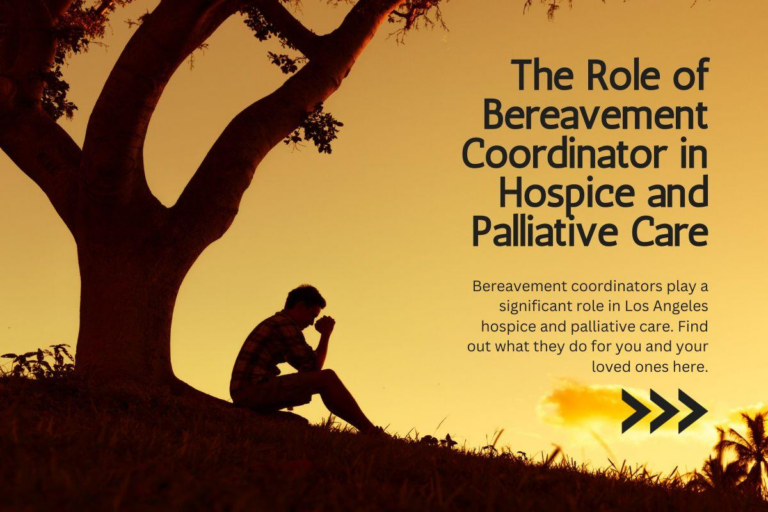In the sensitive realm of hospice Los Angeles, the journey doesn’t end with a patient’s passing. Grief, a complex emotion, often follows, and families are left grappling with the loss of their loved ones. This is where bereavement coordinators play an indispensable role.
Tasked with providing emotional support and resources during the mourning period, they are the guiding force helping families navigate the tumultuous waters of grief.
Table of Contents
Assessment of Grieving Needs
A bereavement coordinator starts their work often before the patient’s passing, assessing the family’s needs. This involves understanding the family dynamics, cultural or religious beliefs about death, and any potential factors that may complicate the grieving process, such as past traumas or unresolved conflicts.
Counseling Services
One of the primary responsibilities is offering grief counseling. Bereavement coordinators provide a safe space for family members to express their feelings, share their memories, and grapple with their emotions without judgment.
Facilitating Support Groups
Grieving can be an isolating experience. Coordinators often organize or refer family members to support groups to connect with other people going through similar experiences. These groups can be general or tailored to specific needs, such as groups for widowed spouses, children, or those who have lost someone to a particular illness.
Educational Resources
The grieving process is different for everyone; many might not know what to expect. Bereavement coordinators provide educational materials on grief’s stages, coping strategies, and self-care during mourning.
Memorial Services
Coordinators often assist families in organizing memorial services or remembrance ceremonies. This might involve connecting them with local service providers, suggesting readings or rituals, or even leading the ceremony.
Referrals
In cases where a family member’s grief is incredibly profound or complicated, a bereavement coordinator might refer them to specialized mental health professionals for more intensive therapy.
Coordinate with the Care Team
Bereavement coordinators work closely with the broader Los Angeles or Glendale hospice and palliative care team, sharing insights about the family’s emotional state, which can influence care decisions and communication approaches.
Community Outreach
They may also work in a broader capacity, giving talks in the community or offering training sessions for professionals and volunteers on grief and its complexities.
Monitoring and Follow-Up
The grieving process doesn’t have a set timeline. Coordinators usually maintain contact with families for a year or more after the loss, checking in periodically, offering continued resources, or simply being a listening ear.
Administrative Tasks
Like any role, there’s an administrative component. This includes maintaining records of interactions, tracking the progress of those they’re assisting, and staying updated on the latest resources and research related to grief.
Supporting Families and Patients
In addition to supporting families after a patient’s passing, bereavement coordinators often work with patients themselves, helping them come to terms with their diagnosis and preparing them for the end-of-life journey.
Evaluating the Success of Bereavement Support
Bereavement coordinators often measure their impact through the healing journeys of those they support. Success is seen in the gradual transformation of grief into acceptance and the ability to move forward in life.
Personal Stories of Healing
To emphasize the role’s significance, hearing personal stories of healing and resilience from those who have benefited from bereavement support underscores the positive impact these coordinators make.
Continuous Learning
Given the intricate nature of grief, bereavement coordinators often engage in continuous learning, attending workshops, seminars, and conferences to deepen their understanding and enhance their skills.
Conclusion
In conclusion, the role of a bereavement coordinator in Glendale or Los Angeles hospice and palliative care settings is multifaceted and deeply impactful. While the medical team focuses on the physical aspects of care, bereavement coordinators tend to the emotional and psychological needs, ensuring that families have the support and resources to navigate the challenging grief journey.
They are the unsung heroes, bringing solace, understanding, and comfort during one of life’s most difficult times.
FAQs
1. What qualifications are required to become a Bereavement Coordinator?
Bereavement Coordinators typically have a background in counseling, social work, or psychology. They often hold advanced degrees in these fields.
2. How long does bereavement support typically last?
The duration of bereavement support varies from person to person. It can extend for several months or even years, depending on individual needs.
3. Do Bereavement Coordinators work in hospice facilities only?
No, Bereavement Coordinators can work in various settings, including hospitals, home healthcare, and community organizations.
4. Is bereavement support only for family members of the deceased?
Bereavement support is available not only for family members but also for friends, caregivers, and anyone affected by the loss.
5. Can I seek bereavement support even if some time has passed since the loss?
Yes, bereavement support is available at any stage of the grieving process. It is never too late to seek help and support.

